Enhanced TDS
Knowde-enriched technical product data sheet
Identification & Functionality
- Chemical Family
- Chemical Name
- CASE Ingredients Functions
- Fluids & Lubricants Functions
- Technologies
- Product Families
- Chemical Structure
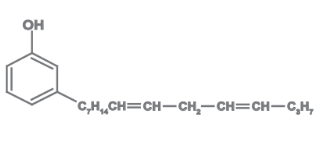
Features & Benefits
- Labeling Claims
- CASE Ingredients Features
- Product Benefits
- Lowers viscosity while maintaining performance
- Preserves chemical and water resistance
- Good dilution and acceleration effects
- Improves flexibility
- Improves pigment wetting properties
- Usable on both sides on an epoxy formulation
- Light color
- Low odor
- Low migration rate
- Low volatility and high flash point
- Non-toxic
- Based from natural, renewable, non-food raw material feedstock
Applications & Uses
- Markets
- Applications
- Compatible Substrates & Surfaces
- Fluids & Lubricants Type
- Adhesive & Sealant End Applications
- Fluids & Lubricants End Use
- Use Level
- max. 20% (of total resin weight)
- Product Applications
- Cardolite NX-2026 was designed as an accelerator and formulation tool to reduce VOC levels and viscosity on coating systems used in heavy duty marine, protective, industrial, and floor coatings.
- Although higher in viscosity than some other modifiers, the structure of this product gives excellent dilution efficiency to help rapidly reduce viscosity for improved pigment wetting, flexibility, and general application properties.
- Coating physical properties such as water resistance, corrosion protection, color stability, chemical resistance, and gloss are not significantly compromised with the addition of NX-2026.
- This product can be added to either component of an epoxy system to provide good cure acceleration and replace or reduce levels of hazardous accelerators like nonylphenol.
Properties
- Color (Properties)
- Physical Form
- Mechanical Properties
Value Units Test Method / Conditions Lap Shear Strength (Steel)* 16.53 MPa - Tensile Strength* 54.69 MPa - Tensile Modulus* 2433.9 MPa - Elongation At Break* 5.29 % - Flexural Strength* 98.6 MPa - Flexural Modulus* 2595.5 MPa - Compressive Strength* 76.4 MPa - Compressive Modulus* 1566.6 MPa - Glass Transition Temperature* 72.5 °C - - Typical Properties
Value Units Test Method / Conditions Color max. 2 Gardner ASTM D1544 Viscosity (at 25°C) max. 60 cPs ASTM D2196 Purity min. 96 % NTM-GC3 Density (at 25°C) 7.76 lbs/gal ASTM D1475 Flash Point min. 260 °C ASTM D93 Solid Content max. 0.5 % ASTM D2369-98 Deblock Temperature 128.0 °C - Isocyanate (NCO) Type (10.4% NCO) PPG prepolymer - - Bio Content 98.0 % Measured pH approx. 7 Theoretical Estimation 100 % - Note
MECHANICAL PROPERTIES
*Test Method: Epoxy was blend with 20% of NP or Cardanol and cured with TETA Cure condition: 25°C/16-24h+100°C/2h cured
Sample: Epon828/NX-2026/TETA=80/20/10.23
- Cardanol, NX-2026, showed increased flexibility compared to Nonyl Phenol.
- Addition of Cardanol improves bond strength.
- Nonyl Phenol shows less impact on mechanical properties than Cardanol.
Regulatory & Compliance
- Chemical Inventories
Technical Details & Test Data
- Dilution Curve
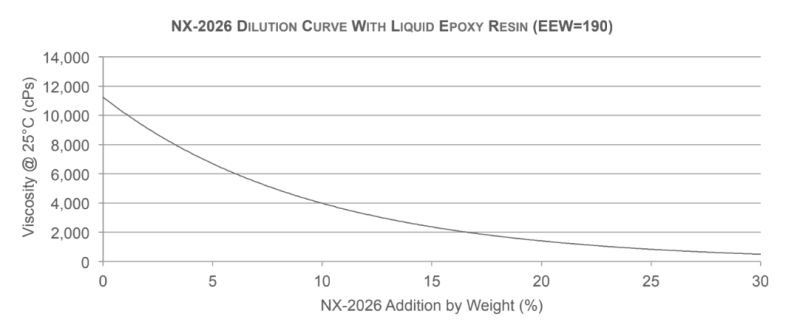
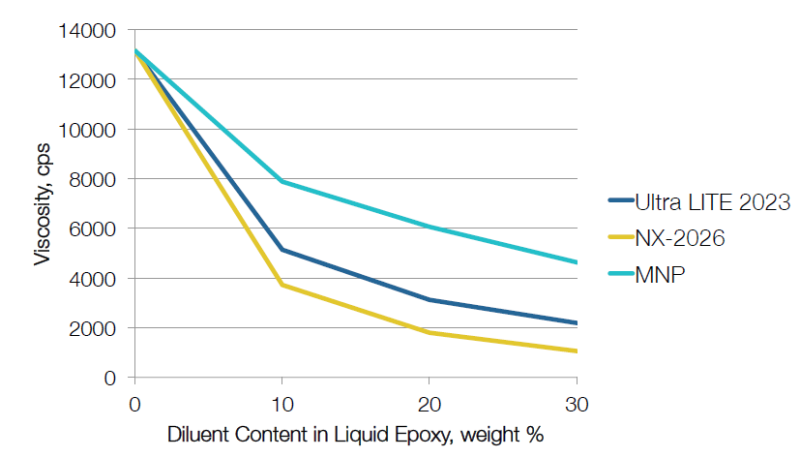
- Dilution Power Graph
- Both cardanol grades show much better dilution power than Decoupage MNP.
- NCO Blocking Agent Technology
High purity and light color cardanol, NX-2026, is an effective isocyanate blocking agent that can be used to replace petro-based phenols. NX-2026 blocked NCO systems should be lower in viscosity and require lower deblocking temperatures than phenol. Moreover, cardanol can act as a flexibilizer in the final matrix.
- LCA Results
Results for each kg of NX-2026 Produced Impact category Unit Nut China Abiotic depletion (minerals) kg Sb-eq 3.85E-07 Abiotic depletion (fossil fuels) MJ 19.5 Global warming (GWP100a)* kg CO2-eq 1.92 Ozone layer depletion (ODP) kg CFC-11-eq 1.05E-07 Photochemical oxidation kg C2H4-eq 3.65E-04 Acidification kg SO2-eq 8.94E-03 Eutrophication kg PO4- eq 2.84E-03 *Excluding CO2 storage, only production
- Environmental burden is bigger for NX-2026 due to additional processing steps required to achieve higher purity.
- Acceleration Effect
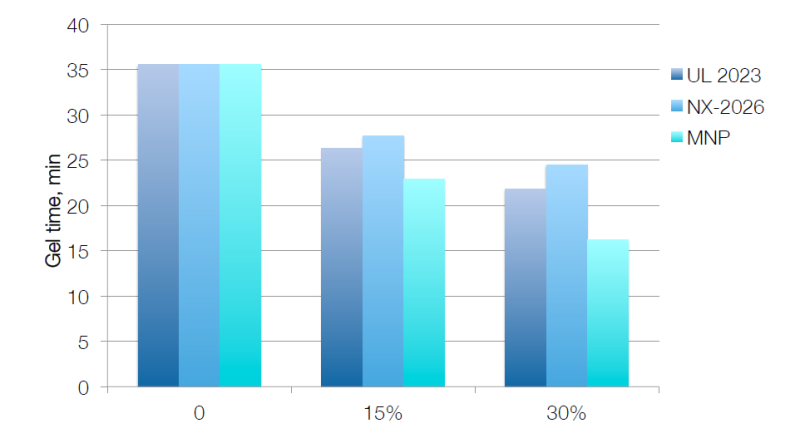
- MNP shows fastest acceleration based on gel time, but both cardanol grades still provide good acceleration.
- Viscosity Profile
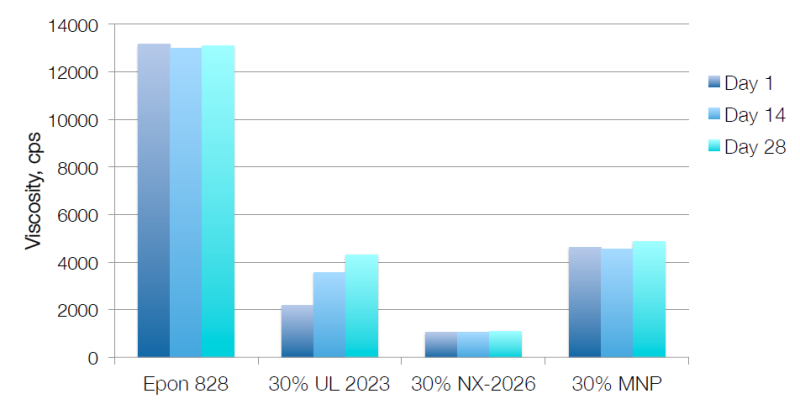
- Viscosity Advancement with D.E.R. 331
- NX-2026 shows the best stability with Epon 828. Better choice than UL 2023 for part A.
Storage & Handling
- Storage Condition
Cardolite products may absorb moisture and carbon dioxide when left in open containers, which could result in increased viscosity, discoloration, reduction of reactivity, and/or crystallization of the products. These products should be kept tightly sealed in their original containers when not in use, and stored in a cool, dry place.